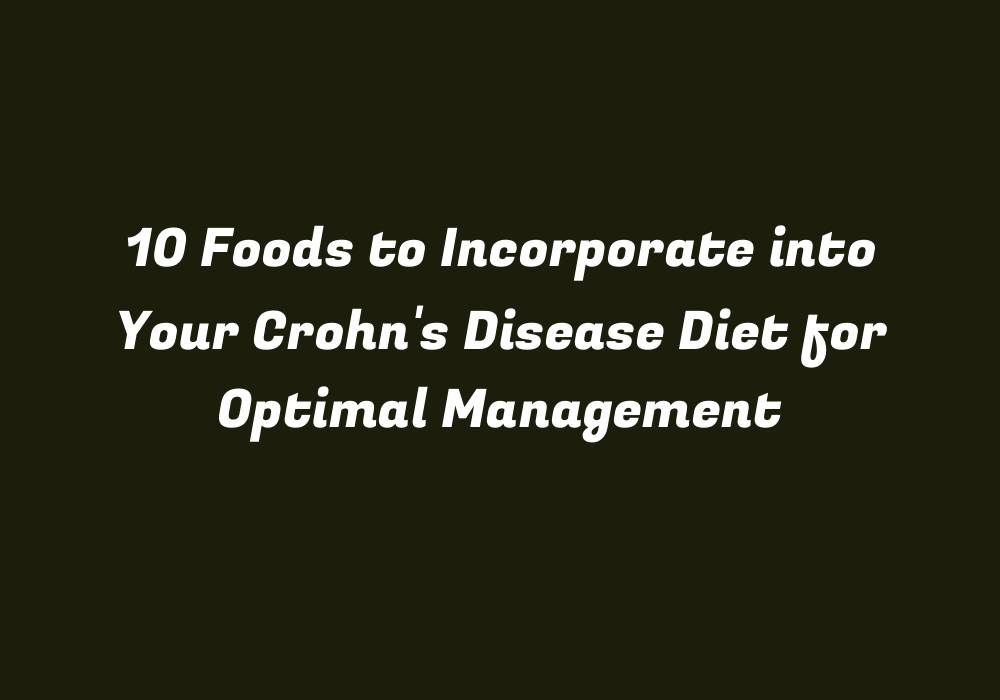Introduction to Crohn’s Disease and Diet Management
Crohn’s disease is a chronic inflammatory bowel condition that affects millions worldwide. Although the exact cause remains unknown, proper dietary habits play a crucial role in managing symptoms and minimizing complications. Here are ten essential foods to consider incorporating into your Crohn’s disease diet for optimal management.
1. Lean Proteins
Protein is vital for muscle growth, repair, and maintaining a healthy immune system. Incorporate lean proteins like fish (such as salmon or trout), skinless chicken, turkey, lean beef, and low-fat dairy products into your diet. These options are generally easier to digest than high-fat alternatives and contribute to overall wellbeing.
2. Whole Grains
Whole grains provide essential nutrients and fiber that aids in maintaining a healthy weight and improving digestion. Choose whole grain options such as brown rice, quinoa, oats, or whole wheat bread to boost your energy levels while supporting your gut health.
3. Fresh Fruits and Vegetables
Fruit is a natural source of vitamins, minerals, antioxidants, and fiber, making them excellent options for Crohn’s disease sufferers. Incorporate a variety of colorful fruits like apples, berries, oranges, and grapes into your daily diet. Additionally, choose an assortment of vegetables such as leafy greens, carrots, sweet potatoes, and bell peppers to reap their numerous health benefits.
4. Healthy Fats
Omega-3 fatty acids can help reduce inflammation in the body, which may be beneficial for those with Crohn’s disease. Incorporate sources of healthy fats like fish oil supplements, flaxseed oil, or ground flaxseeds into your daily diet. Olive oil is also an excellent choice for cooking and salad dressings due to its high monounsaturated fat content.
5. Low-FODMAP Food Options
The low FODMAP (fermentable oligosaccharides, disaccharides, monosaccharides, and polyols) diet is often recommended for individuals with irritable bowel syndrome or Crohn’s disease. Some examples of low-FODMAP foods include white rice, potatoes, chicken, lean beef, legumes, and various fruits like blueberries or kiwi. Consulting a registered dietitian can help you create a personalized meal plan based on this approach.
6. Bone Broth
Bone broth is rich in essential amino acids, minerals, and gelatin that support gut health and immune function. It can be enjoyed as a comforting soup base or sipped on its own for additional hydration. When making bone broth, choose organic, grass-fed bones and avoid inflammatory additives like high-sodium seasonings.
7. Fermented Foods
Fermented foods like sauerkraut, kimchi, miso, and yogurt contain beneficial probiotic bacteria that help promote a healthy balance of gut microorganisms. These foods can aid in digestion and reduce inflammation associated with Crohn’s disease, as long as they are consumed in moderation to avoid excessive gas production.
8. Gluten-Free Options
While not everyone with Crohn’s disease has gluten intolerance, some individuals find relief from symptoms when adopting a gluten-free diet. Explore alternative grains like quinoa, brown rice, buckwheat, and teff to maintain a balanced meal plan while minimizing the risk of gluten-induced inflammation.
9. Prebiotic Foods
Prebiotics are fiber compounds that act as food for beneficial gut bacteria, helping them grow and promote overall health. Incorporate prebiotic-rich foods like artichokes, onions, garlic, chicory root, or bananas into your diet to support the growth of probiotics and enhance digestive function.
10. Focus on Hydration
Staying well-hydrated is vital for maintaining proper digestion and overall health. Drink plenty of water throughout the day, as well as decaffeinated herbal teas like ginger or chamomile to soothe your stomach and support gut function.
In conclusion, a carefully planned diet can make a significant difference in managing Crohn’s disease symptoms and promoting overall health. Incorporating these ten essential food options into your daily meals will help you navigate the challenges of living with this condition while enjoying a balanced and satisfying diet. Always consult with a registered dietitian or healthcare professional to create a personalized meal plan tailored to your unique needs.
